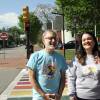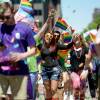Boston has a long history as a hub of LGBTQ+ culture, and one local walking tour group offers a unique way to connect with the city's LGBTQ+ past. Boston By Foot's walking tour educates guests on the city's rich 19th and 20th century gay and lesbian culture with stops at a variety of historically significant sites throughout the city.
Martha Vicinus, one of the Boston By Foot's guides, served as a writer and researcher for the tour, called Boston's LGBTQ Past. She says the group launched the historical walking tour in June 2015, shortly after the U.S. Supreme Court's Obergefell v. Hodges decision, which legalized gay marriage nationally.
"With those events behind us, it seemed appropriate to have a tour. We offered it every year, not just in June," she explained. "But frequently we were asked to do private tours, ranging from the gay club at a boys private school to corporate businessmen who want to bring social issues into the lives of our employees."
Vicinus said the tour covers time periods with widely differing attidudes on same-sex relationships, from eras where such relationships were seen as a common way to "learn to love" and "prepare" for traditional marriages, to the persecution seen in the 1950s.
"There were times, as we know from the Cold War, in which the government and the churches went after gays and lesbians," Vicinus explained. "There were indeed times in which reputations could be destroyed or jobs lost, but also times of immense freedom and certainly very lively culture in the bars."
Stops along the walking tour include a variety of bars that hosted drag shows, the AIDS Memorial Quilt, and the former site of the Napoleon Club, a gay bar where Judy Garland gave an encore performance for fans in 1967 following her final performance in Boston. The tour also educates guests about intersectionality in LGBTQ+ history.
"The Combahee River Collective, which was a group of Black African Americans, issued a statement in 1979 — that is still in print — in which they argue that against the predominantly white women's movement and the predominantly Black male Black power movement. They say that our lives matter intrinsically, and it is important to honor our lives," Vicinus explained. "Even though they don't use the word 'intersectionality,' they are pioneers in pointing out that you can you can have many different identities and you try to hold them together. You can be Black, lesbian and feminist."
Vicinus says she hopes guests walk away from the tour with a more nuanced understanding of LGBTQ+ history.
"Often, they think it is a uniform history of oppression and closeted behavior, and they discover that just absolutely wasn't true. Indeed, there have been oral histories done of people in the 1970s who lived through the period of the '40s and '50s, and some of them will say things like, 'Oh, it was the best possible time to be gay. There were so many bars. It was so much fun.' So, we have to see it as a more complex history than just all bad, or all triumph after 1969 and the Stonewall riots in New York. "
Boston By Foot's tour, Boston's LGBTQ Past is open for registrations of public and private tours.









